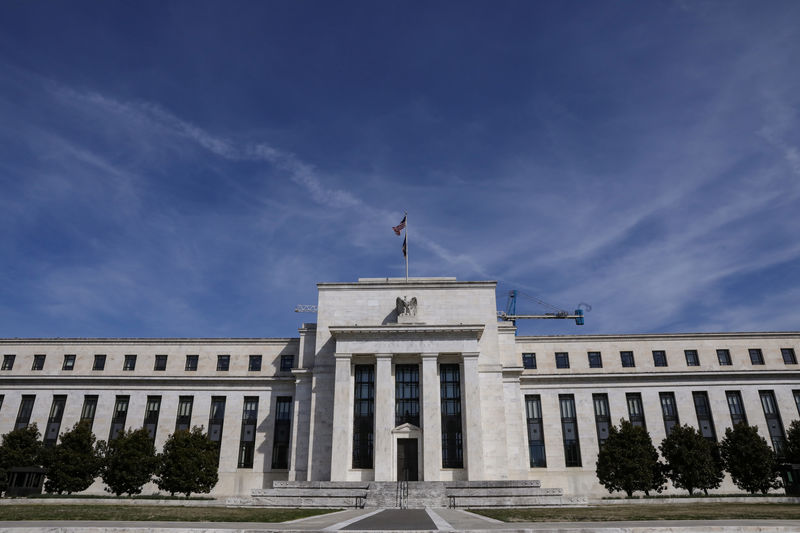By Howard Schneider
WASHINGTON (Reuters) - It takes a lot to kill an economic expansion, typically requiring a major shock to bring growth to a halt and trigger a U.S. recession.
This week investors signaled that moment may have arrived, and one big question is whether that shock has come from President Donald Trump's trade war or a mistake by policymakers at the U.S. Federal Reserve.
As bond markets flashed concern about recession on Wednesday and major stock indices cratered, Trump put the blame squarely on the Fed for continuing to raise rates through the end of last year. Even Trump foe and New York Times economics columnist Paul Krugman dinged the Fed for "a clear mistake."
In raising interest rates four times last year "the Federal Reserve acted far too quickly, and now is very, very late," in reversing itself and cutting borrowing costs only modestly so far, Trump tweeted. "Too bad, so much to gain on the upside!"
Earlier on Wednesday, White House trade adviser Peter Navarro told Fox Business Network the U.S. central bank should cut rates by half a percentage point "as soon as possible," an action he claimed would lead "to 30,000 on the Dow."
A cut of that magnitude would typically be associated with serious economic risk, not an economy with record low unemployment and ongoing growth.
As it stood, major U.S. stock indices slumped by around 3% by Wednesday's close with the blue chip Dow Jones Industrial Average (DJI) suffering its largest percentage loss of the year. Bond investors pushed the yield on the 30-year Treasury bond to a record low.
Causing even more concern: The yield on the 2-year Treasury note briefly went above the yield on the 10-year Treasury note, the sort of "inversion" that, when it proves durable, has preceded prior U.S. recessions.
Trump himself took note of the development, blasting the Fed chair he appointed - Jerome Powell - as "clueless" in a tweet citing the "CRAZY INVERTED YIELD CURVE."
FROM AS GOOD AS IT GETS TO GLOOMY
It was perhaps the most dramatic bit of evidence yet of just how the landscape for the Fed has changed over the past few months, from one that Powell deemed "remarkably positive" as of last October, to one of rising risks for the United States' record-setting, decade-long expansion.
As of last fall, the Fed thought the economy, fueled by the Trump administration's massive $1.5 trillion tax cut package and spending plans, would grow strongly enough to justify steadily higher rates.
At that point the threat of a recession seemed distant unless some sort of outside event intervened to throw the economy off course - something like the collapse of the dot-com stock market bubble ahead of the brief 2001 recession, or the implosion of the U.S. housing and credit markets ahead of the more serious 2007-2009 Great Recession.
Yet, as Trump's trade rhetoric and his imposition of tariffs on trading partners ratcheted up this year, particularly since May, investors have acted as if a breaking point had been reached.
Global trade flows have dropped. Economic growth in Germany, a bellwether economy of sorts given its reliance on exports, contracted in the second quarter. Data also showed industrial output in China fell to more than a 17-year-low in July. Indices of uncertainty also have spiked.
If Fed policy suddenly seemed out of step, it was perhaps inevitable given the difficulty of keeping up with Trump's whipsaw approach to trade policy, and the growing sense that the fallout may be deeper and longer lasting than expected.
"The challenge is that Trump's trade policy has proven so erratic that you cannot relieve the sense of uncertainty," as firms adjust to what may be a years-long rearrangement of global supply chains and cost structures, said Tim Duy, an economics professor at the University of Oregon. "So the question becomes is policy going to be easing enough ... or remain so tight that the economy remains vulnerable?"
Investors in federal funds futures contracts are currently pricing in a quarter-point rate cut at each of the Fed's remaining three policy meetings in 2019. That would take the benchmark fed funds rate to a range of between 1.25% and 1.50%.
Along with the rate cut at the last Fed meeting in July, it would also mean the U.S. central bank will have used up almost half the rate-cut "ammunition" assembled during a slow-moving, and ultimately truncated series of rate increases begun in 2015.
For Trump, who is hoping to make the economy a central part of his case for his 2020 re-election campaign, further rate cuts could not come fast enough. He has been berating the Fed for its rate increases for more than a year - since even before his trade rift with China morphed from being considered an economic annoyance to a larger and potentially durable risk.
AHEAD OF CURVE?
Compared to the prior two recessions, the Fed may actually be ahead of the curve.
In both the 2001 and 2007 downturns, the Fed raised rates even after the yield curve inverted and did not cut until just a few months before the start of recession about a year later.
In the current case, it signaled a policy shift in January, when it removed the expectation of further rate hikes from the table, and then cut rates two weeks before Wednesday's yield curve inversion.
Whether that proves adequate is another matter.
In an interview scheduled to air on Fox Business Network on Friday, former Fed chief Janet Yellen said she felt the U.S. economy remained "strong enough" to avoid a downturn, but "the odds have clearly risen and they are higher than I'm frankly comfortable with."
